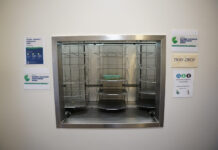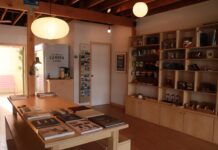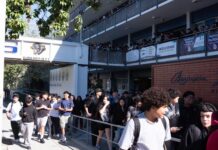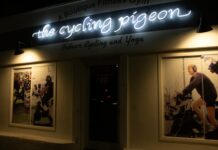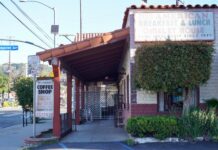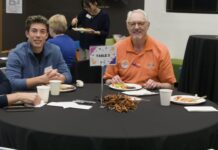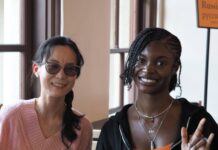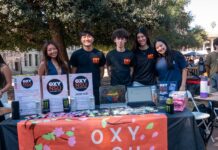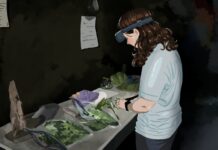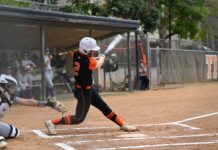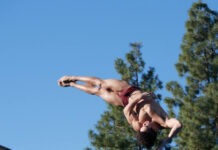Project S.A.F.E. hosted its annual Take Back the Week (TBTW) event last week as part of Sexual Assault Awareness Month, with several changes to keep it current. Coordinators renamed the survivor vigil a “speak-out,” in order to empower sexual assault survivors and their allies.
“[TBTW] is a way for us to, one, inform the students and administrators, staff and faculty, of different issues in terms of communities that are impacted by sexual violence, but also allowing survivors to have a space to dialogue,” Occidental Survivor Advocate and TBTW organizer Naddia Palacios said.
The event started Monday with a resource fair in the academic quad and a screening that night of the documentary “Boys and Men Healing,” which explores the healing process of men who were sexually abused. A panel discussion with representatives of 1in6, a non-profit organization that benefits men who have been sexually abused, followed the screening. On Wednesday night, organizers screened “Brave Miss World,” which documents Miss World 1998 Linor Arbagil’s attempts to raise awareness about sexual assault. Director Cecilia Peck hosted a discussion afterwards. Clinical psychologist Dr. David Lisak, who is a leading voice in the national conversation about sexual assault, gave the keynote address Thursday evening. Thursday’s events culminated in a march up to the Greek Bowl, where organizers held a speak-out for survivors and allies. The week ended on Sunday with Jackson Katz’s Mentors in Violence Prevention program, a seven-hour violence prevention training session for student athletes.
This year, coordinators altered the terminology used to describe Thursday night’s speak-out. In the past, the event was framed as a solemn vigil. This year, however, Project S.A.F.E. Programming Assistant (PA) and Diplomacy and World Affairs major Summer Peet (sophomore) proposed redefining the evening as a speak-out and rally. The idea to rename the event came after Peet had a conversation with a student at Yale University in a similar programming position.
“We moved away from the term of ‘vigil’ and tried to create an empowering place for both survivors and allies,” Peet said. “We wanted to have a space for survivors to speak out or for people to feel comfortable with other people who care. I think the word ‘vigil’ carries some negativity with it, and I wanted this to be an empowerment event to be about healing and to not have an unnecessarily somber undertone to it.”
According to Peet, numerous organizations co-sponsored specific events and many of their representatives volunteered throughout the week. Women and Youth Supporting Each Other (WYSE), Delta Omicron Tau sorority, Amnesty International and the Public Health Club co-sponsored the entire week and the Remsen Bird Fund, Intercultural Affairs and Student Life co-sponsored the keynote speaker. Outside organizations like 1in6 also played a part in the week.
“Oxy is a member of our 1in6 Men On Campus National Task Force, a thought partnership of campus coordinators from all over the nation interested in collaborating and improving their resources for men,” member Martha Marin said via email. “1in6 helps men who have had unwanted or abusive sexual experiences in childhood live healthier, happier lives.”
A drawback of the week for Peet was the low attendance at some of the week’s events. The screenings of “Boys and Men Healing” and “Brave Miss World” both had low turnouts, which Peet attributes to the sensitive nature of the issues they addressed. Project S.A.F.E. PA and politics major Carmen Tellez (senior) organized the screenings for the week and was not deterred by the small turnout.
“There weren’t a ton of people, and I think it may be a matter of making [screenings] more accessible timing-wise,” Tellez said. “The documentaries can be very triggering. I think that might play a role in why people might be hesitant to attend it…. They are difficult conversations for anyone to have whether or not they are a survivor or an ally.”
In Thursday’s keynote address, Lisak discussed the changes he feels are necessary in overall attitudes toward sexual assault. He stated that in order for the movement to continue with its current momentum, more parents, student and alumni need to enter the conversation to put pressure on school administrations.
“I’ve worked with the U.S. military for more than ten years and the pressure that Congress puts on the military is an absolutely critical ingredient in the changes that are occurring there,” Lisak said. “We need similar pressure in education. The Department of Education provides some of that, but the emergence of student activism has created a whole new sense of pressure.”
Lisak also addressed the growing body of knowledge on how trauma affects the brain and its implication for the handling of sexual assault cases. Lisak suggested that simply changing the way investigators posed questions to assault victims would yield more credible interviews.
“Dr. Lisak had a great presentation on the effects of trauma. I think he really helped the audience understand the way that survivors experience PTSD and flashbacks,” sociology major and Vice President of Delta Dorothy Gray (junior) said via email. “He offered concrete examples of positive and negative questioning techniques for law enforcement that would also apply to talking to a loved one who has experienced violence. One of the best parts of the presentation was his presentation of ‘freeze, flight or fight’ as instinctual reactions to danger.”
After Lisak’s talk, several students carried lights in a march up to the Greek Bowl. While there, students sat on the grass and participated in a two-hour speak-out.
In looking ahead to next year’s TBTW, Peet said that the clothesline project is one aspect of the week-long event that will change.
“It’s a neat project but it’s intrinsically very difficult to put on because we want survivors to be able to make a T-shirt but do so in a way that’s also private for them,” Peet said. “Logistically it’s a difficult program to put on.”
The week will also likely end on Thursday night with the speak-out and rally next year, in contrast to this year’s final event held on Sunday. Peet hopes that more students will participate as volunteers in next year’s TBTW as well as other events that Project S.A.F.E. hosts.
![]()




